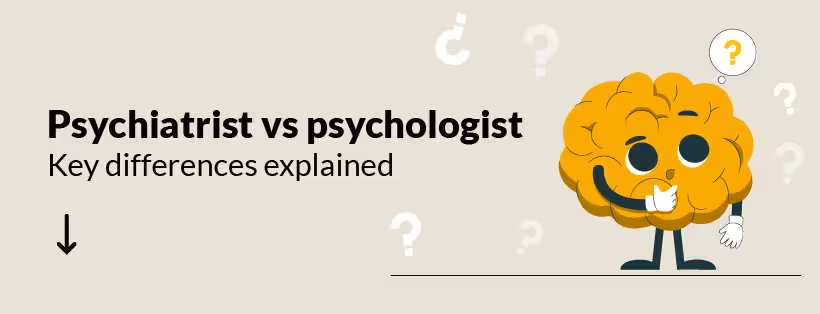Psychiatrist vs psychologist: Key differences explained
Life’s ups and downs mean we can all face mental health struggles from time to time. Medical treatment can help, but choosing the right support can be challenging. We consider the differences between a psychiatrist versus a psychologist and other mental health professionals so you can understand your options.


Psychiatrists vs psychologists: A quick comparison
Here’s an overview of some of the key differences between a psychiatrist and a psychologist that we cover in this guide:
- Psychiatrists are medical doctors who can diagnose and treat mental health conditions using therapy and medication, whereas psychologists focus on therapy and can't prescribe medication.
- Their training pathways differ significantly. Psychiatrists must go through medical school, while psychologists follow a psychology-focused academic path.
- Psychiatrists typically treat more complex or severe cases, especially those needing medication. Psychologists often help with anxiety, depression and behavioural disorders.
- Private psychiatrist appointments tend to cost more than sessions with psychologists.
- Other mental health professionals, such as counsellors, CBT therapists, and psychotherapists, can also provide effective talking therapies, especially for less severe issues.
Read next: Our latest research into the average cost of seeing a private psychologist in the UK
Psychiatrists are medical doctors who specialise in treating mental health conditions. Psychiatrists can work in the NHS and private practice. NHS psychiatrists may work in in-patient or out-patient clinics in hospitals, typically as part of a community mental health team (CMHT) that includes psychologists, specialist nurses and other medical and support staff.
They can treat various mental health conditions, including serious mental health issues that require medication or inpatient treatment in a hospital.
A clinical psychologist is a mental health professional who can diagnose and treat several mental health conditions, including anxiety, depression, and alcohol or drug addiction. They can also provide support to patients with developmental conditions.
Like psychiatrists, psychologists can work in private practice or the NHS as part of their community mental health services, or for the NHS Child and Adolescent Mental Health Services (CAMHS). There are different specialist fields in psychology. We’ve mentioned clinical psychology, but psychologists can also specialise in working in sport, education or other fields.

The difference between psychiatrists and psychologists often lies in the types of mental health conditions they treat and the treatment they can provide. However, there are also differences in the training they receive and the price you can expect to pay if you have private treatment. Let’s consider the main differences in detail.
Psychiatrist
Psychiatrists are medical doctors, meaning their training differs from that of clinical psychologists. They can also provide treatment for the most serious mental health problems.
Training
Psychiatrists undergo several years of training before qualifying as a consultant psychiatrist. They’ll start by attending medical school to earn their degree, typically spending five or six years at medical school, depending on their chosen qualification route. They’ll then receive two years of foundation training where they work in different medical disciplines before starting three years of psychiatry training, followed by another three years of higher psychiatry training.
Their training after medical school and foundation training lets them experience different specialisms before they qualify.
Medication
As psychiatrists are medical doctors, they can prescribe medication as part of mental health treatment. This means that they can treat mental health disorders that respond to medication, such as bipolar disorder or schizophrenia, alongside other forms of mental health treatment.
Professional bodies
When psychiatrists leave medical school and complete their foundation training, they’re added to the General Medical Council (GMC) register. The GMC is the regulatory body for all medical doctors in the UK.
Psychiatrists can join the Royal College of Psychiatrists, which sets professional standards for psychiatrists, supports trainees and offers continuing professional development training.
Cost of private treatment
NHS treatment is free at the point of use, and you can typically choose which mental health professional you want to see via Right to Choose. However, you might decide to pay for private treatment, which can mean a shorter waiting time. The cost of a private psychiatrist can vary widely depending on location and experience. An initial assessment with a psychiatrist can cost from around £350, with follow-up consultations ranging from around £180 for a 30-minute consultation to around £295 for an hour. You can also expect to pay £25 to £30 for a private prescription if your doctor needs to prescribe medication, although you’ll need to agree to this first.
What support does a psychiatrist offer?
Psychiatrists can treat a broad spectrum of mental disorders, varying from anxiety, depression and panic attacks to obsessive-compulsive disorder (OCD), bipolar disorder and personality disorders. Adult patients may experience psychosis, hallucinations or disordered thinking.
Physical health issues can have co-existing mental health symptoms, and psychiatrists can provide specialist support, particularly where these conditions become chronic or patients face a terminal diagnosis. Psychiatrists and psychologists both use talking therapies as part of their treatment programmes, but psychiatrists can also prescribe medication if needed.
As we’ve mentioned, psychiatrists can work with both adult and child patients, although the skills required often differ. Psychiatrists treating children and young people via CAMHS must also work with their families to help them understand how family dynamics impact their child’s mental health.
Psychologist
Psychologists focus on using therapy, including counselling, to assess and treat mental disorders, including anxiety and depression. Clinical psychologists work in private practice and the NHS alongside other mental health practitioners. They can also diagnose mental health issues.
Training
The training to become a chartered psychologist starts with an undergraduate degree accredited by the British Psychological Society, followed by an accredited doctorate in clinical psychology, meaning academic training takes at least four years. Clinical psychologists must complete postgraduate training accredited by the Health and Care Professions Council.
Psychologists don’t go to medical school and can apply for jobs in the NHS or private practice after they complete their academic training.
Medication
Psychiatrists and psychologists differ in that psychologists aren’t medical doctors and can’t prescribe medication. Psychologists focus on helping people understand how they think and feel, and how their behaviour impacts them and those around them. In the NHS, psychologists often work in community mental health teams with psychiatrists and other mental health professionals, providing multi-disciplinary support.
The British Psychological Society (BPS) has been involved in a consultation regarding giving prescribing rights to some psychologists, but there have been no changes to date.
Professional bodies
Psychologists practising in the UK must register with the Health and Care Professions Council (HCPC). The HCPC regulates 15 professions, including psychologists, occupational therapists and speech and language therapists. They set professional standards, accredit training programmes including degrees and continuing professional training, register all qualified professionals and take disciplinary action when needed.
Some professional bodies, such as the British Psychological Society (BPS) and the British Association for Counselling and Psychotherapy (BACP), offer voluntary registration and ongoing training for psychologists. BPS members can apply for chartered status, which can help boost their professional reputation.
Cost of private treatment
There’s increased demand for mental health services. The Royal College of Psychiatrists found that increased waiting times for NHS treatment led 78% of patients to seek emergency treatment from A&E or call 999, 111 or another crisis line. Prompt treatment can help prevent symptoms of mental illness from worsening, meaning you might consider paying for private treatment to avoid the wait.
The cost of private treatment with a psychologist varies depending on where you live in the UK. Our survey of psychologists in the UK found that prices for an initial consultation varied from £107 in the North East to £160 in London, with an average price of £129.
What support does a psychologist offer?
Psychologists typically offer talking therapies. There are different types of talking therapy depending on the mental illness they’re treating and how severe the symptoms are. As we’ve mentioned, psychologists can’t prescribe medication as they aren’t medical doctors. Talking therapies can help with many mental health challenges, including anxiety, depression, phobias, intrusive thoughts and stress. They can also help support people with long-term or serious physical health problems like diabetes or cancer.
If you experience a mental health problem that would benefit from a talking therapy, there are alternatives to treatment with psychiatrists and psychologists. Other mental health professionals can offer appropriate support. These fall into three main categories: counsellors, CBT therapists and psychotherapists. There are some overlaps in the treatment they can provide and the training they receive. Like psychologists, these professionals aren’t medical doctors and can’t prescribe medication.
Here’s what you can expect from each practitioner.
There are various talking therapies, meaning you can choose the one that best suits your needs. Some mental health professionals, such as CBT therapists, may specialise in one type. Psychiatrists and psychologists working within community mental health services can often provide access to a broader range of therapies.
In the NHS, patients can access in-person or online one-on-one treatment, group sessions, or choose guided self-help, depending on their needs. Talking therapies include counselling and CBT, alongside more specialised therapies such as behavioural activation, which helps people with depression start to enjoy life again, and interpersonal therapy (IPT) that helps people with depression identify and change relationship problems. Eye movement desensitisation and reprocessing (EMDR) treats patients with post-traumatic stress disorder, who may experience flashbacks or traumatic memories.
The kind of therapy you need will usually depend on your symptoms.
As a general guide, if you’re experiencing severe symptoms or need medication, you’ll usually need to see a psychiatrist for treatment. Psychologists can often help with less severe symptoms or issues, such as anxiety or depression. You may also benefit from a targeted therapy like CBT, or need long-term support from a psychotherapist.
How you access treatment will vary depending on whether you choose NHS or private care.
NHS treatment
Your NHS GP is often the first port of call for NHS care. You can speak to your GP if you’re unsure about the type of help you need. Alternatively, if you’re an adult and want to access talking therapies, you can self-refer via the NHS website. There are separate services for children and young people under 18.
Private healthcare
You can book a private appointment directly with many mental health professionals, such as counsellors or CBT therapists. Some psychiatrists and psychologists let you book an appointment and fund it yourself, while others require a GP referral.
If you have private health insurance, you can access support and treatment depending on what your policy covers. Most health insurance includes a few counselling sessions but can also provide a broader range of treatments, including inpatient and outpatient psychiatry. If you have medical insurance through work, they may also have an Employee Assistance Programme with access to counselling and advice on other sources of support.
Getting professional advice
myTribe’s guides aim to provide you with the information you need to understand your healthcare options and make an informed choice. They aren’t a substitute for professional advice, so always speak to your GP about any health concerns.
If you’d like to learn more about taking out health insurance to access private treatment, contact us for a comparison quote. We’ll connect you with a high-quality, regulated broker for advice tailored to your needs.
What our readers say
We are rated Excellent on Google from 150+ reviews. Our reviews relate to the service provided by both myTribe and its partners.
Disclaimer: This information is general and what is best for you will depend on your personal circumstances. Please speak with a financial adviser or do your own research before making a decision.
Frequently Asked Questions
Is it better to see a psychologist or a psychiatrist?
It depends on what you need. If you have a serious mental health issue that requires medication, only a psychiatrist can prescribe it. Psychiatrists and psychologists can both provide talking therapies for less severe conditions.
Who is more qualified, a psychologist or a psychiatrist?
The path to qualification for psychiatrists and psychologists is quite different. A psychiatrist has a medical degree and a further eight years of postgraduate training before becoming a consultant. A psychologist must have undergraduate and postgraduate degrees. Psychiatry training typically takes longer and includes general medical training, whereas psychologists often specialise in psychology as soon as they go to university.
Can a psychologist give a diagnosis?
Yes. Psychologists can assess, diagnose and treat patients.








